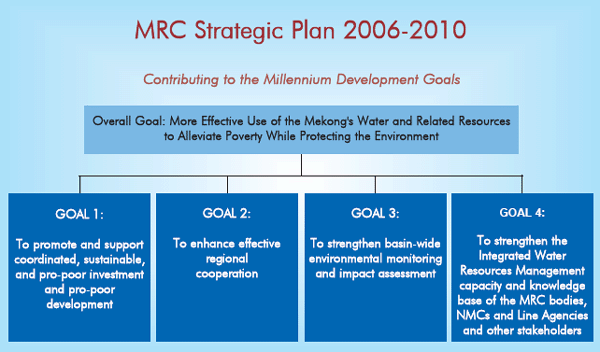MRC Strategic Plan 2006-2010
Setting the scene for the future
After a decade of building a first class river basin organisation, the MRC is now ready to move into a new phase whereby it will instigate a more comprehensive application of the 1995 Mekong Cooperation Agreement through the implementation of the Mekong Programme for sustainable development of water and related resources in the Mekong Basin.
This is the basis of the MRC's new Strategic Plan 2006-2010. The plan was formulated to support development goals as articulated in such declarations as the UN's Millennium Development Goals, the Ministerial Declaration on Managing Water Resources in Southeast Asia, as well as goals emerging from an extensive consultation process involving member countries, donors and civil society.

There is a high demand for developing the economic potential of the river for food, energy and transport. Therefore, more investments in irrigation, navigation, fisheries, flood management and mitigation and hydropower are bound to occur. It is the role of the MRC, as an International River Basin Organisation, to ensure that these investments will be well-coordinated, sustainable, and of benefit to the poor.
The key orientations of the new Strategic Plan 2006-2010 include the adoption of an Integrated Water Resources Management approach with emphasis on basin-wide development plans, fuller integration and cooperation with the work of our regional development partners, closer cooperation with Dialogue Partners China and Myanmar, and an effective utilisation of MRC's knowledge base and expertise to turn the previous years of work and achievements into action.
The overall goal of the MRC is “To Support the Member States for More Effective Use of the Mekong's Water and Related Resources to Alleviate Poverty while Protecting the Environment". This support to the Member States is the core business of the MRC.
The Strategic Plan's four goals correspond to the four roles of the MRC with regard to water and related resources:
Goal 1: To promote and support coordinated, sustainable, and pro-poor development.
Goal 2: To enhance effective regional cooperation.
Goal 3: To strengthen basin-wide environmental monitoring and impact assessment.
Goal 4: To strengthen the Integrated Water Resources Management capacity and knowledge base of the MRC bodies, NMCs, Line Agencies, and other stakeholders.
Three broad issues were identified as central to the development of the Strategic Plan 2006-2010:
- Tangible results focused on poverty reduction through sustainable development.
- Creating ownership and value-added with a broadened interpretation to include better integration of MRC and national development plans.
- Adopting an integrated water resource management approach which is necessary for the MRC to jointly promote development and conservation to ensure sustainable cooperation for the utilisation of the Mekong's common resources.
The most pressing priority for all the Member States is to achieve higher levels of economic and social development.
The role of the MRC in serving the joint interests of its Member States is to promote sustainable development in the Mekong River Basin.
The primary added value of MRC as an international river basin organisation is to focus on joint and basin-wide developments, including long-term development scenarios, identification of important joint and basin-wide projects and programmes, and the analysis of implications (economic, social and environmental) of ongoing and proposed developments in the basin including the cumulative impacts of national developments. In this role, the MRC will work to find long-term solutions to common problems in the region.
With its unique legal mandate, knowledge base and expertise in the areas of water and related resources development together with its effective regional cooperation framework in these areas, MRC is particularly well-placed to provide guidance and support to sustainable development. In particular, the MRC will focus its efforts on:
- Supporting joint and basin-wide projects and programmes, initially including the four riparian states of the LMB, later, hopefully, also the two upper riparian countries China and Myanmar
- Transboundary projects, or suites of complementary projects, between two or three riparian states.
- National projects, or land and water policies, with significant or cumulative basin-wide implications. Given this emphasis, the MRC will avoid dispersing its efforts over a large number of small projects that have no significant impacts.
W ithin this structure, the basin planning function through the Basin Development Plan (BDP) will take on a pivotal role in a
highly integrated and coordinated manner. This planning function will use acquired knowledge from the MRC Programmes to build an overall perspective of what the development needs and knowledge gaps are, and that will eventually set the agenda of the MRC Programmes. The BDP will further ensure that project programming is done in harmony with the IWRM Strategic Directions.The Integrated Basin Flow Management (IBFM) process is another important and effective vehicle for implementing IWRM in MRC. IBFM is a set of multi-disciplinary activities providing information and knowledge to decision makers on economic benefits and environmental and social impacts of development as related to changes in the flow regime.
The present general organisational structure of the Secretariat will be continued. There will be four Divisions reporting to the CEO, each headed and managed by a senior riparian officer (one from each country).
By the year 2010 the MRC aims to have made major progress towards:
- Being acknowledged as a leading International River Basin Organisation operating by the best practice principles of sustainable development and management of the basin's resources and in organisational processes and practices.
- Being accepted as a “centre of excellence” for information and knowledge backed by excellent analytical and management systems pertaining to the water-related and environmental resources of the basin.
- Supporting implementation of feasible and justifiable development projects that reflect the social and environmental aspirations of the riparian countries, and grouping priority projects into a basin-wide Mekong Programme.
- Building awareness and understanding throughout the basin of the MRC as a world-class International River Basin Organisation that contributes to poverty alleviation and sustainable development.
Choose a newsletter: